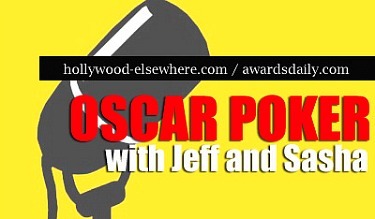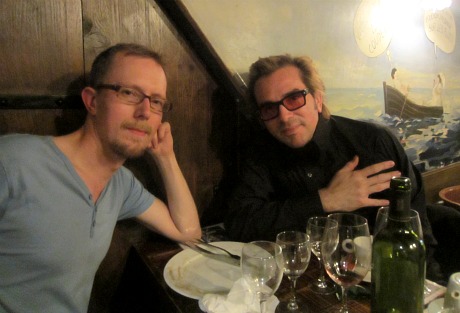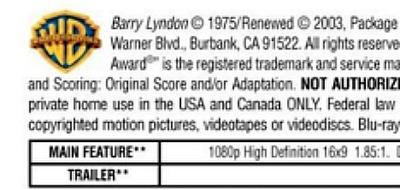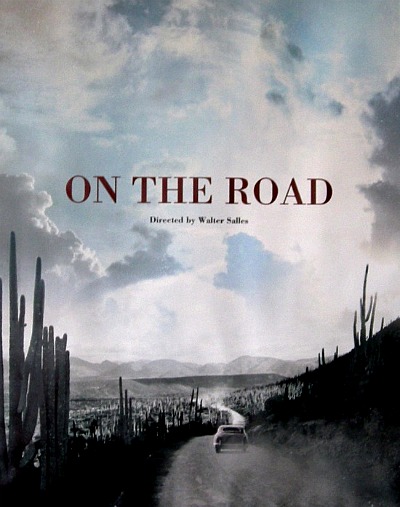In a 5.23 Some Came Running entry, MSN critic Glenn Kenny said my agitated posting about Warner Home Video’s jacket-cover statement that their brand-new Barry Lyndon Bluray has been masked at 1.85 was on the unwarranted and
hysterical side. No, it wasn’t. Not as it turned out. It was pretty much dead-on.
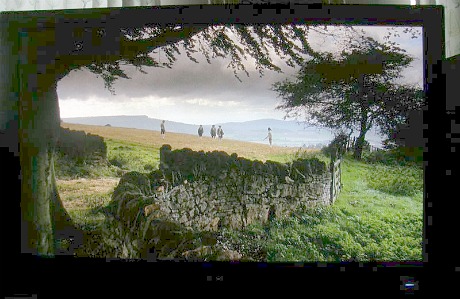
Glenn Kenny’s snap of his high-def screen showing (he says) a 1.78 to 1 aspect ratio image from the
Barry Lyndon Bluray.
Yes, I hadn’t seen the Bluray due to obvious limitations (i.e., being on the fly in Europe) but the jacket copy, which I ran a screen-capture of, declares what it declares. Kenny initially said the Lyndon Bluray is masked at 1.66; he later reneged because, he said, the Lyndon Bluray is actually masked at 1.78 to 1. If this is true then the WHV jacket copy is wrong. And yet 1.78 is (a) pretty damn close to 1.85, and (b) delivers a significant cropping of top-bottom material that had been viewable on the 2007 Barry Lyndon DVD.
Kenny initially offered what he believed was visual proof — i.e., pics of the Lyndon Bluray off his high-def TV — that the high-def version of Stanley Kubrick‘s 1975 classic version is presented at 1.66. He later amended this to say his TV had been incorrectly calibrated and that 1.78 was the correct aspect ratio.
At no time did Kenny even comment on, much less get into, Kubrick’s reported intention in using a 1.66 aspect ratio to approximate the aspect ratio of 18th Century landscapes.
Portions of my e-mailed response to Kenny went as follows:
“What do you think & feel about WHV essentially waving this off, not only ignoring the fabled 1.59 aspect ratio that mubi reader Tyler Williamson claimed was captured but also dumping the 1.66 that the DVD had? This is important and (I feel) fairly malignant shit. How is this not a kind of desecration? Explain that to me.
“(1) Based on WHV’s decision to publish proof-read copy that says the Barry Lyndon Bluray is masked at 1.85, I was IN NO WAY using an invalid basis for alarm. Bluray jacket-copy is no small or casual matter. Do you think some WHV intern just types it out? Jacket copy is vetted and vetted and vetted again. So why did you more or less say “there goes Wells again, getting it wrong”? That wasn’t right, Glenn.
“(2) Unless your high-def isn’t correctly configured” — which turned out to be the problem — “your own visual proof of a 1.66 aspect ratio does NOT make the case. When I watch a 1.66 film on my 50” Vizio, there are window-box bars on either side of the image, and these are clearly not there on your screen shot. [As noted, Kenny updated this and explained the apparent truth of the matter regarding a 1.78 a.r.] The image extends all the way to both sides, comprising a dead-to-rights 16 x 9 image filling every square inch of your Brooklyn screen. Right now, your Some Came Running shot of the opening image of the cow-pasture duel is lending credence to my concern about a 1.85 image.”
In his updated posting, Kenny extended apologies “to you all and particularly to the BluBrew people, but none to my frenemy Mr. Wells, who went off even more half cocked than I, what with going from box copy rather than the disc itself.” Again — how the hell was I supposed to watch the Bluray on a properly calibrated high-def screen in my sixth-floor Paris apartment? Vetted jacket copy was what I had to work with.
Kenny concluded by saying that “as disagreeable as 1.78 is, it still isn’t 1.85.” But 1.78 still represents a significant top-bottom trimming of Williamson’s 1.59 or the ’07 DVD’s 1.66 image, and is clearly a dismissal of Kubrick’s reported interest in wanting Lyndon to approximate the shape of 18th Century paintings. Isn’t that the crux of the matter?
“This story isn’t over yet,” Kenny concluded. “As it happens I’m interviewing Leon Vitali, a keeper of the Kubrick flame, tomorrow” — today, he meant — “and this issue will be on the agenda.”
And Vitali, who worked with WHV on the earlier Kubrick DVDs and has presumably been (and is being) compensated for his efforts, is going to bite the hand that feeds?
